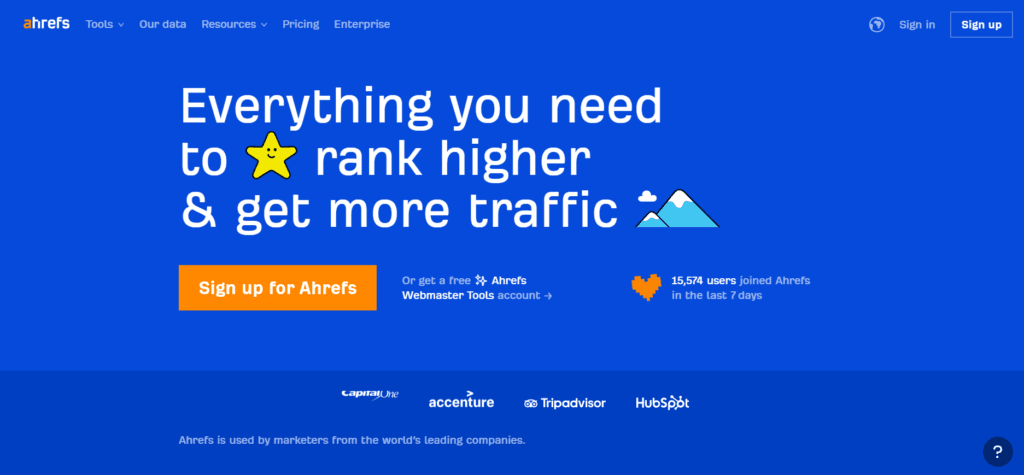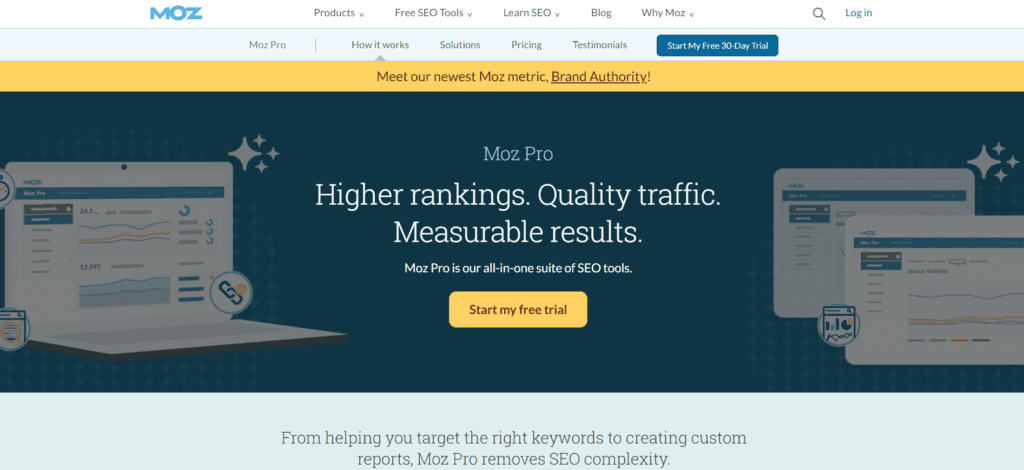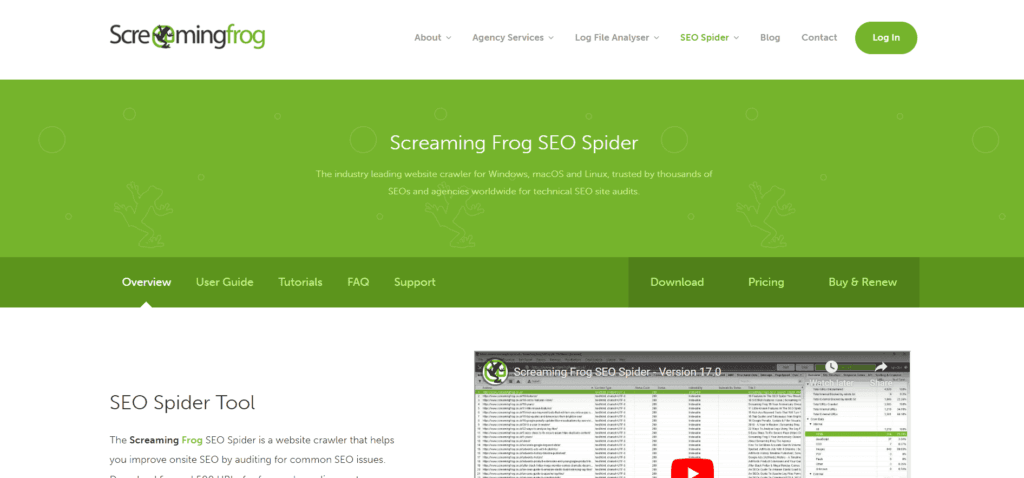In the dynamic world of digital marketing, the David vs. Goliath story plays out daily. Startups, the proverbial Davids, often find themselves pitted against industry Goliaths, established brands with deep pockets and an entrenched online presence.
However, with the right strategy and a keen understanding of SEO competitive analysis, these startups can not only level the playing field but also outrank these giants.
This guide delves deep into the strategies startups can adopt to use SEO as a secret weapon, ensuring they’re not just in the game, but are playing to win.
The Art of Identifying the Right Competitors
The first step to outranking established brands is knowing who you’re up against. Not every business competitor is an SEO competitor, and understanding this distinction is vital.
Differentiating between Business Competitors and SEO Competitors
While your business competitors are companies offering similar products or services, your SEO competitors might be entirely different. They’re the ones ranking for the keywords and search terms relevant to your business.
Sometimes, they might not even be in the same industry but might be capturing the online audience you’re targeting. For startups, understanding this distinction is pivotal to creating a tailored and effective SEO strategy.
Tools for Initial Competitor Identification
In the dynamic world of online marketing, knowing your competitors is half the battle won. While business competitors are those vying for your target market, SEO competitors may differ. These are brands and businesses competing for visibility on the same keywords as you. Thankfully, numerous tools can give startups an upper hand in identifying these SEO competitors.
Let’s delve into some of these tools.

#1 SimilarWeb
Features:
SimilarWeb offers insights into website traffic, keyword rankings, referral sources, and more. It provides a snapshot of a website’s global and country rank, along with the traffic source breakdown.
Pros:
- Comprehensive view of competitor’s online strategy
- Traffic sources breakdown aids in understanding paid vs. organic traffic.
- Mobile app insights provide a view into the competitor’s mobile performance.
Cons:
- Data might not be accurate for very niche or new websites.
- Requires a learning curve for new users.
Pricing:
While there’s a free version with limited insights, the enterprise version is tailored according to business needs.

#2 Alexa
Features:
Amazon’s Alexa provides competitive analysis, showing sites that are similar to any website. It also displays a site’s global and country rankings, audience demographics, and more.
Pros:
- User-friendly interface.
- Provides insights into audience demographics.
- Backlink checker identifies new link-building opportunities.
Cons:
- Some argue its traffic estimates aren’t as accurate as other tools.
- Limited features in the free version.
Pricing:
Plans start from $9.99/month and go up to $799/month for advanced features.

#3 Ahrefs
Features:
Known for its extensive backlink database, Ahrefs also offers competitor research features. The ‘Competing Domains’ section reveals sites competing for similar keywords.
Pros:
- Comprehensive backlink analysis.
- Identifies content gaps to outdo competitors.
- Keyword explorer reveals competitors’ high-performing keywords.
Cons:
- Some features may feel overwhelming for beginners.
- Can be pricier than other tools.
Pricing:
Plans range from $99/month for freelancers and startups to $999/month for large agencies.

#4 SEMrush
Features:
SEMrush is a powerhouse that offers tools not just for competitor research but for overall SEO planning. Its ‘Domain Overview’ tool provides insights into any domain’s online performance.
Pros:
- Offers side-by-side domain comparisons.
- Traffic analytics helps understand a competitor’s audience.
- Displays historical data to track competitors’ growth over time.
Cons:
- With vast features, it can be overwhelming for new users.
- Keyword data may sometimes lag behind real-time.
Pricing:
Starts from $119.95/month for the Pro version, going up to $449.95/month for Business.

#5 BuzzSumo
Features:
BuzzSumo is tailored for content analysis. It shows what content performs best for any topic or competitor, revealing their most shared and engaged content.
Pros:
- Great for content strategy development.
- Provides influencer information for a particular niche.
- Alerts for brand mentions or industry updates.
Cons:
- More focused on content than holistic website analysis.
- Limited keyword research features.
Pricing:
Plans start at $99/month and go up to $499+/month for enterprises.

#6 Moz’s Link Explorer
Features:
Part of Moz’s suite, Link Explorer, offers insights into backlink data and anchor text. It identifies linking domains and offers a domain authority score.
Pros:
- User-friendly interface.
- Spam score helps identify potentially harmful backlinks.
- Provides a proprietary Domain Authority score.
Cons:
- The database might not be as extensive as Ahrefs.
- Occasional delays in backlink indexing.
Pricing:
Plans range from $99/month to $599/month.

#7 SpyFu
Features:
SpyFu is all about “spying” on competitors. It offers insights into the keywords competitors are ranking for, both organic and paid.
Pros:
- Ad history feature helps track competitors’ PPC strategies over the last 13 years.
- Allows downloads of competitors’ keyword lists.
- Identifies underutilized keywords in your niche.
Cons:
- Data for smaller websites might be limited.
- UI could be improved for better user experience.
Pricing:
Prices start at $39/month, with more advanced features available at $79/month.

#8 Majestic
Features:
Majestic is renowned for its robust link intelligence data. It helps businesses, especially startups, to navigate the web’s vast link landscape.
Pros:
- Provides a detailed Trust Flow and Citation Flow score, invaluable metrics to determine the quality of backlinks.
- Offers a rich backlink history tool to track competitors’ link acquisition over time.
- Contains a unique ‘Link Context’ feature to understand the content around backlinks.
Cons:
- Less beginner-friendly compared to some other tools.
- Focused mainly on backlink analysis, lacking broader SEO insights.
Pricing:
Plans start from $49.99/month for the Lite version and reach up to $399.99/month for the API access level.

#9 Social Blade
Features:
Though Social Blade is predominantly known as a platform for tracking social media statistics, it provides invaluable data about how competitors are performing on platforms like YouTube, Twitch, and Instagram.
Pros:
- Gives insights into user growth and engagement metrics.
- Predicts future trends based on current data.
- Helpful for understanding competitors’ content strategies on social media.
Cons:
- Limited to social media platforms.
- Lacks depth in SEO-specific data.
Pricing:
It offers a free version, but premium plans start at $3.99/month.

#10 BuiltWith
Features:
BuiltWith dives into the technology stack behind websites. Startups can gain insights into what CMS, server, advertising, and analytics tools their competitors are utilizing.
Pros:
- Provides an extensive list of all tools and technologies a website uses.
- Helps startups understand the tech investment areas of competitors.
- Offers technology adoption trends for the larger market.
Cons:
- Overwhelming data for newcomers.
- Less about SEO strategies and more about the technical aspect of a website.
Pricing:
The free version provides basic insights, while the Pro version starts at $295/month.
Case Study: ‘Dollar Shave Club vs. Gillette’ – A Startup’s Approach to Identifying Giants
When Dollar Shave Club burst onto the scene with their viral marketing video, they weren’t just targeting business competitors; they were taking on SEO giants. By identifying the massive online presence of brands like Gillette, Dollar Shave Club tailored their SEO strategy to target keywords and demographics where they could gain a foothold.
Their approach was not just to compete but to identify gaps in the SEO strategies of established brands and exploit them.

Harnessing Keyword Analysis for Strategic Advantage
Keywords are the building blocks of any SEO strategy. For startups, they represent opportunities. Tapping into these opportunities means understanding where the gaps lie and how to leverage them.
Tools: SEMrush, Ahrefs, Ubersuggest for Keyword Gap Analysis
Keyword gap analysis is about identifying keywords your competitors rank for but you don’t. Tools like SEMrush and Ahrefs provide comprehensive data on the keywords your competitors are targeting, their search volume, and the potential traffic they can bring. Ubersuggest, another invaluable tool, provides keyword suggestions that might not be on your radar, offering untapped opportunities.
Identifying High ROI Keywords Overlooked by Big Brands
Established brands sometimes overlook niche keywords, focusing instead on high-volume search terms. For startups, these overlooked keywords can offer an impressive ROI. They might have lower search volumes, but they also come with lower competition and a more targeted audience.
How Startups Can Leverage Long-Tail Keywords for Quicker Wins
Long-tail keywords, often more specific and longer phrases, can be goldmines for startups. They typically have lower competition and cater to a more niche audience, ensuring better conversion rates.
Moreover, big brands often neglect these in favor of broader keywords, providing startups with a clear advantage.
Case Study: ‘Dropbox’ – How Targeted Keyword Strategy Led to Rapid Growth
When Dropbox started, cloud storage was already a competitive space with giants like Google and Microsoft. However, Dropbox’s targeted keyword strategy focused not just on generic terms like “cloud storage” but also on specific pain points users faced, such as “easy file sharing” and “secure online storage.”
This approach allowed them to capture a more targeted user base, leading to rapid growth.

Deep Dive into Backlink Profiles of Big Brands
Backlinks serve as votes of confidence from other websites. They are instrumental in building domain authority and trust. Understanding the backlink profile of your established competitors can offer insights into their strengths and potential vulnerabilities.
The Correlation Between Backlinks and Domain Authority
Backlinks are more than just mere links pointing to a website; they’re indicators of trust and authority. Websites with high-quality backlinks from reputable sources typically have a higher domain authority, which can lead to better rankings in search results. Startups must understand this dynamic, recognizing that not all backlinks are created equal. Quality trumps quantity every time.
Analyzing the Quality vs. Quantity of Backlinks Using Tools Like Moz’s Link Explorer
While having a large number of backlinks can seem impressive, what truly matters is the quality of those links. Tools like Moz’s Link Explorer allow startups to delve into the backlink profiles of competitors, identifying the quality of their links, the domains linking to them, and potential opportunities for their own link-building strategies.
Strategies to Earn Quality Backlinks in Industries Dominated by Giants
Competing with established brands in terms of backlink quantity can be daunting. However, startups can focus on earning high-quality links from authoritative domains. Some strategies include:
- Creating unique, high-value content that naturally attracts backlinks.
- Guest posting on reputable industry websites.
- Building relationships with industry influencers and bloggers.
- Engaging in relevant community discussions and forums.
Case Study: ‘HelloFresh vs. Major Food Brands’ – Earning Credibility Through Strategic Link Building
HelloFresh, a meal kit delivery service, entered a market with established food brands. Instead of competing directly, they crafted a content strategy that focused on the unique value they provided, such as easy-to-follow recipes and fresh ingredients.
This led to high-quality backlinks from cooking blogs, nutritionists, and food critics. Their strategic link-building efforts not only increased their domain authority but also positioned them as a credible alternative to major food brands.

Analyzing and Emulating On-Page SEO Strategies
On-page SEO elements, often considered the fundamentals of SEO, can significantly impact how a website ranks. By analyzing and emulating effective on-page strategies, startups can ensure they’re following best practices.
Importance of Meta Tags, URL Structure, and Internal Linking
Meta tags, including title tags and meta descriptions, play a crucial role in influencing click-through rates from search results. Additionally, a clean and descriptive URL structure can improve user experience and SEO. Startups must also not overlook the power of internal linking, as it helps distribute page authority and guide users through the website.
Tools Like Screaming Frog for On-Page SEO Analysis

#1 Screaming Frog SEO Spider
Features:
A favorite among many SEO professionals, Screaming Frog SEO Spider is a downloadable software that crawls through websites and offers valuable insights into various on-page elements.
Pros:
- Provides real-time results and can crawl thousands of URLs simultaneously.
- Identifies broken links, redirects, duplicate content, and missing metadata.
- Visualizes internal linking structures and site architectures.
Cons:
- Can be overwhelming for SEO beginners.
- The desktop software approach may not suit all users.
Pricing:
They offer a free version with limited features. The paid license is priced at £149.00 per year.

#2 SEMrush On-Page SEO Checker
Features:
A versatile tool, SEMrush’s On-Page SEO Checker provides actionable suggestions based on your competitors’ strategies and industry best practices.
Pros:
- Offers content optimization suggestions tailored for specific target keywords.
- Highlights technical issues and provides actionable insights.
- Integrates well with other SEMrush suite tools, offering a comprehensive SEO solution.
Cons:
- Some might find it on the pricier side for startups.
- Requires a learning curve to maximize its full potential.
Pricing:
SEMrush offers various pricing tiers. Their Pro plan starts at $119.95/month.

#3 Ahrefs Site Audit
Features:
Ahrefs, renowned for its backlink analysis, also offers a powerful site audit tool that dissects on-page elements and site health.
Pros:
- Provides a website “Health Score” that quickly highlights potential issues.
- Detects issues like slow-loading pages, duplicate content, and broken links.
- Offers visual reports for better comprehension.
Cons:
- Can be expensive for some startups.
- A broad tool range could make the main focus slightly diluted.
Pricing:
Their pricing starts at $99/month for the Lite plan and goes up to $999/month for the Agency plan.

#4 Moz Pro On-Page Grader
Features:
Moz Pro’s On-Page Grader assesses individual web pages and how they can potentially rank for specific keywords. Moz, known for its domain authority metrics, has been a staple in the SEO community for years.
Pros:
- Easy-to-understand metrics and actionable insights.
- Provides keyword optimization recommendations.
- Grades web pages on a scale, simplifying the task of identifying weak areas.
Cons:
- Might seem basic to seasoned SEO professionals.
- Some users have reported inconsistencies in data when compared to other tools.
Pricing:
Moz Pro packages start at $99/month and can go up to $599/month for their Premium package.

#5 Sitebulb Website Crawler
Features:
Sitebulb is an intuitive website crawler that comes with a comprehensive suite of tools to analyze on-page SEO, among other things.
Pros:
- Offers a visually pleasing and user-friendly interface.
- Highlights issues with a ‘Hint’ system, which categorizes problems and gives priority scores.
- Diverse range of audit types, including mobile usability, international SEO, and more.
Cons:
- Newer to the market compared to others, hence might not have all the refinements yet.
- Some advanced features may have a learning curve for beginners.
Pricing:
Sitebulb offers a free version with limited functionalities. Their premium plans start at $35/month.
Quick On-Page Wins Startups Can Implement
Small tweaks can lead to big wins. For startups, some quick on-page wins include:
- Optimizing title tags and meta descriptions for higher CTR.
- Ensuring each page has a single H1 tag that is descriptive and keyword-optimized.
- Implementing a logical URL structure that’s easy to understand.
- Regularly updating older content to remain relevant.
Case Study: ‘Slack vs. Traditional Communication Tools’ – Dominating Through On-Page Excellence
When Slack entered the scene, traditional communication tools like Skype dominated. However, Slack’s emphasis on user experience, combined with impeccable on-page SEO, provided them with a competitive edge.
Their site was structured with clear navigation, each page was optimized for search intent, and they used internal linking to guide users through their unique features. This on-page excellence played a significant role in their rapid growth.

Content Strategy: Being Different and Better
Quality content is the backbone of any successful SEO strategy. However, for startups, it’s not just about creating content; it’s about creating content that’s distinct and superior. By understanding the gaps in the content landscape and leveraging their unique selling points, startups can surpass even the most established competitors.
How Startups Can Carve a Niche with Unique Content
Finding a niche in content strategy is essential. While established brands have broad content, startups can pinpoint specific areas of expertise or audience pain points. By providing in-depth content on niche topics, startups can quickly become go-to resources. This includes crafting long-form content, conducting original research, or tapping into emerging trends before they become mainstream.
Tools like BuzzSumo for Content Gap Analysis
Content is the cornerstone of digital marketing, and understanding where your content falls short compared to your competitors can give you a significant edge. Conducting a content gap analysis helps in identifying topics and keywords that competitors are ranking for but you aren’t, thus unveiling opportunities to create value-driven content. Let’s delve into some of the most effective tools for this purpose.

#1 BuzzSumo: The Social Listening Giant
Features:
BuzzSumo shines as a tool that focuses on identifying top-performing content across various social networks. By entering a keyword, domain, or a competitor’s domain, users can see which pieces of content are gaining traction.
Pros:
- Provides insights on the most shared content across major social networks.
- Can identify key influencers in your niche.
- Offers content alerts to keep you updated on trending topics.
Cons:
- Focused more on social performance than traditional SEO.
- Some data might require deeper analysis for actionable insights.
Pricing:
BuzzSumo’s pricing starts from $99/month for the Pro version, with more advanced features available in higher-tier plans.

#2 Ahrefs Content Gap Tool
Features:
A part of the larger Ahrefs SEO suite, the Content Gap tool allows users to find keywords that multiple competitors are ranking for, but you are not.
Pros:
- Provides a direct way to see where competitors are outperforming you.
- Integrates seamlessly with other Ahrefs tools for a comprehensive analysis.
- Can analyze both organic and paid keywords.
Cons:
- The platform can be overwhelming for beginners due to the multitude of features.
- Pricey for startups on a tight budget.
Pricing:
Ahrefs plans start at $99/month, with more advanced plans available at higher prices.

#3 SEMrush Topic Research Tool
Features:
SEMrush’s Topic Research tool is designed to give you a broader view of potential content topics based on entered keywords or domains.
Pros:
- Offers a ‘mind map’ view for visual brainstorming.
- Can identify popular questions asked around a topic.
- Integrates with other SEMrush tools for enhanced workflow.
Cons:
- While comprehensive, it may require time to understand all features.
- Not as specialized for content gap analysis as some other tools.
Pricing:
SEMrush offers various plans starting at $119.95/month, with capabilities expanding in the higher-tier packages.

#4 Moz Keyword Explorer
Features:
Moz’s Keyword Explorer is an all-in-one tool for keyword research. While it offers a comprehensive look into keyword potential, it also aids in content gap analysis by comparing keyword profiles of different websites.
Pros:
- Provides keyword suggestions based on entered topics.
- Offers SERP analysis which can show the type of content ranking for specific terms.
- Utilizes a unique metric called “Priority” which combines various data points to identify high potential keywords.
Cons:
- Data might sometimes differ from other keyword research tools.
- For in-depth content gap analysis, there might be a steeper learning curve.
Pricing:
Moz Pro, which includes the Keyword Explorer, starts at $99/month. They also offer a free version with limited queries.

#5 SpyFu’s Content Research Tool
Features:
SpyFu is traditionally known for competitor keyword analysis. However, its content research tool is a hidden gem. It provides insights into which content is performing best for your competitors based on shared keywords.
Pros:
- Directly reveals content pieces from competitors which are drawing traffic.
- Allows for a deep dive into backlinks, shared keywords, and ranking history of competitor content.
- An intuitive user interface that simplifies the complex process.
Cons:
- The focus remains largely on competitors; startup innovators might want more expansive topic discovery.
- Some features might seem redundant for users only interested in content analysis.
Pricing:
SpyFu has various plans, with the basic one starting at $39/month. Features expand as you move to higher-tier plans.
Importance of Video, Infographics, and Other Multimedia Content
Modern content goes beyond just written articles. Multimedia content like videos, infographics, podcasts, and interactive tools can engage audiences differently and often more deeply. They also allow startups to leverage platforms like YouTube, which might offer less competition than traditional search engines.
Case Study: ‘Airbnb’ – Disrupting the Hospitality Industry with Unique Content Offerings
Airbnb is a stellar example of content differentiation. While hotel chains focused on traditional advertising, Airbnb crafted unique travel stories and local experiences. Their blog showcased real experiences from hosts around the world, leveraging user-generated content. By celebrating local cultures and offering insider travel tips, Airbnb’s content appealed directly to modern travelers seeking authentic experiences.
Technical SEO: The Unsung Hero for Startups
While content and backlinks often get the spotlight, the technical health of a website is a critical component of SEO success. It influences how search engines crawl and index a site, directly impacting visibility in search results.
Emphasizing Mobile Optimization, Site Speed, and Structured Data
With mobile searches surpassing desktop, mobile optimization isn’t optional; it’s mandatory. Sites must load quickly and offer a seamless mobile experience. Moreover, structured data helps search engines understand content context, leading to rich results that can boost CTR.
Leveraging Free Tools Like Google’s Mobile-Friendly Test and PageSpeed Insights
Google offers startups a plethora of free tools to check the technical health of their site. The Mobile-Friendly Test checks for mobile optimization, while PageSpeed Insights provides actionable tips for improving site speed. Regular audits can ensure that startups stay ahead of technical issues.
Potential of Progressive Web Apps (PWAs) for Startups
PWAs blend the best of web and mobile apps, offering a mobile-optimized, offline-capable experience. For startups, especially in e-commerce or media, PWAs can significantly enhance user engagement and conversions.
Case Study: ‘Robinhood’ – Gaining an Edge in Fintech through Technical SEO Mastery
Robinhood, a fintech startup, understood the essence of technical SEO. Their platform was not only intuitive but technically sound, with swift load times, a mobile-optimized design, and structured data that made their content easily understandable for search engines.
Their focus on technical excellence paved the way for their content and backlink strategies, propelling them to industry leadership.
Startups’ Secret Weapon: Agility and Innovation
The competitive landscape is continually evolving. While larger entities might have more resources, startups often have the advantage of agility. They can adapt quickly to the dynamic SEO world, pivoting their strategies based on data and emerging trends. This agility, combined with a willingness to innovate, can make startups formidable competitors against established brands.
Being Quick to Adapt to Changes in the SEO Landscape
SEO is far from static. With algorithm updates, evolving user behaviors, and technological advancements, what works today might not work tomorrow. Startups, unfettered by layers of bureaucracy, can make quick decisions, test new strategies, and iterate based on performance metrics.
This adaptability can lead to capturing significant market share before larger brands can react.
The Advantages of Being a Smaller, More Nimble Entity in the Digital Realm
Larger organizations often suffer from a “ship turning” syndrome. They can’t pivot quickly due to entrenched processes or the sheer size of their operations. Startups, on the other hand, can make rapid changes to their website, content strategy, or backlinking approach.
This nimbleness can result in capturing emerging trends, adjusting to algorithm updates faster, and ultimately achieving higher rankings in the SERPs.
Innovative SEO Strategies to Consider: Voice Search Optimization, AI-Driven Content Creation
Innovation is the lifeblood of startups, and it shouldn’t stop at product development. Forward-thinking SEO strategies like optimizing for voice search or utilizing AI for content creation can set startups apart.
As voice searches become more prevalent through devices like Amazon’s Alexa or Google Home, tailoring content to these platforms can lead to untapped traffic sources. Meanwhile, AI tools can assist in generating content, identifying optimization opportunities, and automating routine SEO tasks.
Wrapping it up
SEO competitive analysis isn’t about emulating everything that established brands do. It’s about understanding their strengths, identifying their gaps, and leveraging a startup’s unique advantages. With the right tools, a keen eye for detail, and a penchant for innovation, startups can not only compete with giants but can also carve their niche, achieving both visibility and business growth.
In the grand chessboard of digital marketing, SEO is a vital component. For startups, it can level the playing field, allowing them to compete with and even surpass well-entrenched competitors.
It’s not about the size of the company but the strategy’s agility, depth, and innovation. By employing a robust SEO competitive analysis and building on insights, startups can chart a path to digital dominance.
Read Next :
- The Secret Behind Consistency – What Goes On In The Mind of Inconsistent People
- What Businesses in India Need to Know About the Prevention of Sexual Harassment at Workplace Act
- All About Digital Signature Certificates in India
- A Guide on How Data Science Can Boost Your Startup
- How to Create a Great Infographic that People Want to Share: Tips from Experts




















Comments are closed.